December is going to be a busy month for carbon dioxide pipeline fighters. First, Wolf Carbon Solutions has to re-do its landowner meetings because they failed to notify all of the landowners about their previous meetings. Then Summit Carbon Solutions will be under the microscope before the Utilities Board since Summit is refusing to provide information about safety risks and emergency planning to the Utilities Board. Further, the Utilities Board will be setting the proposed schedule for moving Summit's application through the pipeline permitting process.
Take care,
Pam Mackey Taylor, Chapter Director and Newsletter Editor
What you can do to help the environment
-
Send a letter to the Environmental Protection Agency telling them that you do not want the Cedar River TMDL withdrawn
-
Donate to the Iowa Chapter of the Sierra Club so that we can continue our work.
-
Catch up on this month's lunch and learn education videos
In this issue of the Iowa Sierran
Water Quality and Agriculture
-
Update on PFAS, a toxic chemical
Carbon Dioxide Pipelines
-
Victory!! Shelby County Ordinance protects neighbors of CO2 pipelines
-
Wolf Carbon Solutions re-doing landowner meetings December 5 & 6
-
Pipeline safety preemption fight brewing - Dec. 13
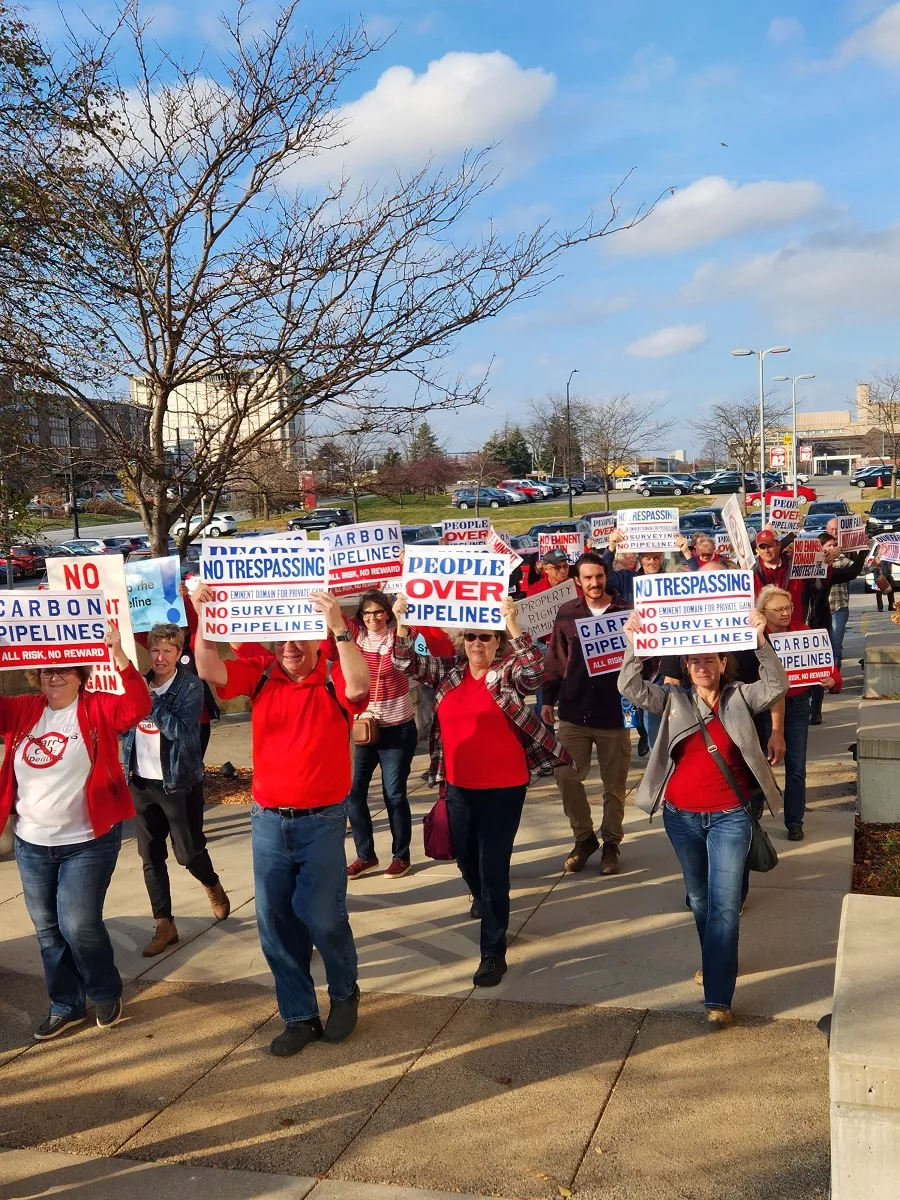
Rally at the Day of Action, November 9, 2022
Plus
-
Join us for interesting and informative webinars and Lunch and Learns
-
Contribute to the Iowa Chapter
-
Volunteer for the Iowa Chapter
-
Calendar of events
-
To see the archive of previous Iowa Chapter newsletters
-
To see the White Pine Needle newsletter
Victory!! Shelby County Ordinance protects neighbors of CO2 pipelines
On November 1 Shelby County passed a carbon pipeline safety ordinance! Sierra Club has been working with counties across the state to formally object to the projects, to pass a safety ordinance and to intervene with the Iowa Utilities Board (IUB). We applaud Shelby County Supervisors for leading the way.
Thus far, the safety issue has been left up to local governments because there are no safety regulations at the State or Federal level specifically for carbon pipelines. The ordinance requires conditional use permits, implements separation distances, application requirements, sets emergency response and hazard mitigation plans, and more.
Pipeline and Hazardous Materials Safety Administration (PHMSA) recently released a report that determined the 2020 Satartia, Mississippi, carbon pipeline rupture was worse than modeled and that the agency needs to conduct studies and implement rulemaking regarding safety, which could take years to complete.
And the safety issue is being challenged here in the state as well. The IUB ordered Summit to file a Risk Assessment, Plume Modeling and Emergency Response Plan; and Summit refused, stating the request is preempted by federal law.
Summit and other pipeline companies want to push their pipelines through before any safety regulations are in place. We have to keep the pressure on our elected and appointed officials - there is no rush. Our safety is more important than pipeline company profits.
Sierra Club Iowa Chapter, among numerous other attorneys representing counties, landowners, and other groups, will be giving oral arguments in favor of Summit filing the required safety documents on December 13, 2022. You can read Sierra Club Iowa Chapter’s hearing brief here and you can join the hearing on Tuesday, December 13, 2022 at 9am at the IUB Office, 1375 E Court Ave, Des Moines, IA.
The ordinance received many letters of support from local landowners, community leaders and appointed officials. Here is what some of the supporters said:
Jennifer Barnett, Superintendent of Harlan Community School District - “I am concerned that any hazardous CO2 pipeline will be constructed very close to our buildings and a rupture could negatively affect 1700 individuals. Our students and staff are my number one priority and until we can show that this project will be economically and environmentally safe I am unable to feel confident with the construction of the pipeline near Harlan and our surrounding communities.”
Phil Markham, Chair of Shelby County Board of Health - “The Shelby County Board of Health, after reviewing potential risk factors associated with Carbon Capture and Storage (CCS) processes and the subsequent piping through Shelby County, expresses concern for the risk of CO2 exposure to humans, the environment, and to livestock.”
Todd Valline, Executive Director of Shelby County Chamber of Commerce and Industry - “On behalf of the Shelby County Chamber of Commerce and Industry, I would like to extend our support for the proposed Shelby County Hazardous Pipeline Zoning Ordinance.”
Jay Christensen, Mayor of Harlan - “Be it resolved, therefore by the City Council of the City of Harlan, on behalf of the Mayor of the City of Harlan and all the citizens of the City of Harlan, support the passage of the Shelby County proposed ordinance.”
Kevin Osborn, Owner of Osborn Realty - “It is in my professional opinion that property values will decrease, therefore with less growth and expansion in the real estate market, the existing homes will incur the cost of existing and future taxes which in essence will hurt existing homeowners and likely see a drop in population in Shelby County.”
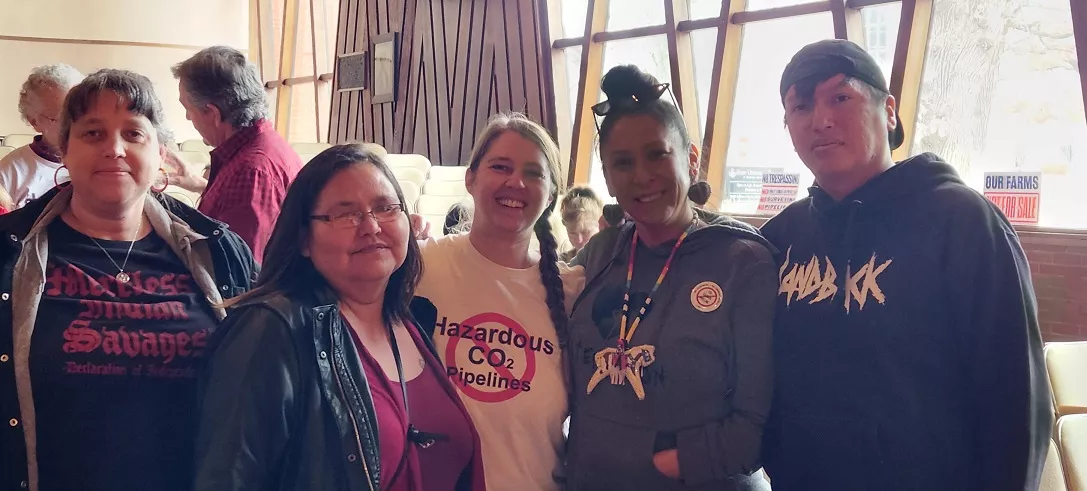
Issues with carbon dioxide pipelines
By Wally Taylor, Iowa Chapter Conservation Chair and Legal Chair. Wally recently participated in "Carbon Pipelines Across Iowa: A Panel Discussion" at the University of Iowa College of Law Hubbell Environmental Law Initiative. This is his opening statement.
The pipeline companies promote their projects as addressing climate change and as being crucial to the survival and success of the ethanol industry. Sierra Club disputes these claims. We are also concerned about the financial implications of the projects.
In order to reach our climate change goals we must have significant reductions in emissions of greenhouse gases. Just capturing CO2 or other greenhouse gasses while the source keeps emitting them will not solve the problem. So carbon capture just enables the continuation of business as usual and prolongs the reliance on fossil fuels. The latest report of the Intergovernmental Panel on Climate Change identified carbon capture as one of the highest cost, lowest mitigation potential options for reducing greenhouse gas emissions. Wind and solar energy and carbon sequestration in agriculture were far more effective. And ADM, a company that was Navigator’s main customer and is now Wolf’s main customer, has admitted that carbon capture is the least effective means to reduce its carbon footprint and that the vast majority of its carbon emissions comes from its coal fired power plant.
We also don’t know what the companies will do with the CO2 once it gets to its destination. Summit has made statements that the CO2 will be used for enhance oil recovery. Navigator has said it has no control over what is done with the CO2. Wolf has said the CO2 will just be buried, but ADM, Wolf’s main customer, has said it plans to use it for enhanced oil recovery.
We must phase out fossil fuels. Specifically, regarding the ethanol and fertilizer plants involved in these pipeline projects, they are taking only the CO2 from the fermentation process, not the main source of CO2 from the plants, the coal or gas fired sources that power the plant, and the machinery that captures the CO2.
Furthermore, studies have shown that the increased greenhouse gas emissions from the agricultural practices used to grow the corn for the ethanol likely contribute to climate change, counteracting any alleged benefit from carbon capture from the ethanol plants.
And the ethanol itself does very little to move us away from fossil fuels. Instead it keeps the fossil fuel industry alive. The U.S. is moving away from oil in spite of the efforts by the oil and ethanol industries. Some states are incentivising electric vehicles and the auto companies are responding to consumer demand and setting deadlines for having an all-electric product line.
The business model for the carbon pipelines also raises concerns. This model is based on two foundations. One is the 45Q tax credit. The other is low carbon fuel standards. The 45Q tax credit allows a company to deduct a certain amount directly from its taxes for each ton of carbon dioxide captured and sequestered. The fact is these pipeline projects would not be happening without the tax credit. So a pipeline company can claim a huge tax break at taxpayer expense for a project, as we have seen, that has little effect on reducing climate change.
A few states, primarily California, have low carbon fuel standards that require gasoline sold in California to meet a certain level of carbon intensity in order to be sold there. It is not clear how much the prospect of selling ethanol to those states will contribute to the economic viability of the pipeline projects. In any event, with those same states transitioning to electric vehicles, any benefit from the low carbon fuel standards will be short lived.
Wolf Carbon Solutions re-doing landowner meetings December 5 & 6
Prior to filing an application to build a carbon dioxide pipeline in Iowa, the pipeline company must notify landowners who are in the corridor and must invite them to an informational meeting.
It became very obvious during the landowner meetings that Wolf Carbon Solutions failed to notify several thousand landowners who were in the route of their proposed pipeline. So the Utilities Board began looking into the issue. Now Wolf has requested a do-over. These meetings will be held December 5th and 6th, with a meeting in each county that will be crossed by the pipeline. The landowners and the public can attend the meetings and ask questions and make comments.
The informational meeting includes representatives of the Utilities Board, representatives of the Office of Consumer Advocate, and representatives of the pipeline company. After the informational meeting in each county, the pipeline company's land agents can begin negotiating the sale of the easement and also surveyors can go on the land to survey.
Wolf Carbon Solutions is contracting with Archer-Daniels-Midland Company (ADM) to run a carbon dioxide pipeline from Cedar Rapids, to Clinton, Iowa, and then to Decatur, Illinois. Along the way, the pipeline will cross 4 Iowa counties – Linn, Cedar, Clinton, and Scott.
The schedule is:
- Cedar County: Noon on December 5 – Cedar County Fairgrounds, The Matthews Building, 220th Street, Tipton
- Linn County: 5:30 p.m. on December 5 – Hawkeye Downs Racetrack, South Hall, 4400 Sixth St. S.W., Cedar Rapids
- Clinton County: Noon on December 6 – Wild Rose Convention Center, 777 Wild Rose Drive, Clinton
- Scott County: 5:30 p.m. on December 6 – River Center (Adler Theater), 136 E. Third St., Davenport
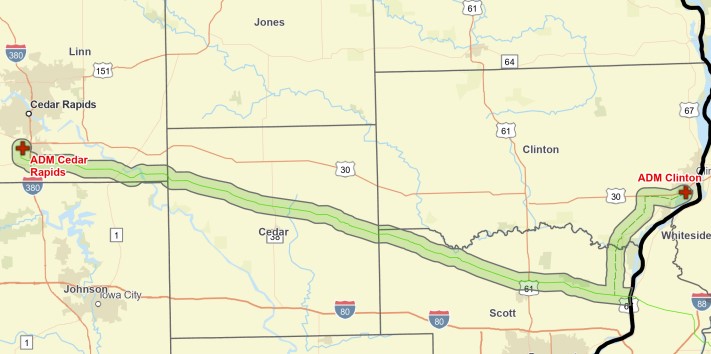
Pipeline safety preemption fight brewing - Dec. 13
Summit Carbon Solutions has filed a series of pleadings at the Iowa Utilities Board (IUB) saying that the Utilities Board cannot consider pipeline safety issues in making its decisions on the carbon dioxide pipelines being proposed to run across the state. Further Summit is claiming that the local land use and zoning ordinances cannot consider safety concerns. The upshot is that Summit does not want to provide a statement of the risks and consequences of a pipeline rupture and an emergency response plan, plus a number of other items.
The lawyers who have weighed in on Summit Carbon Solution's application to build their carbon dioxide pipeline are going before the Utilities Board on December 13, 2022, to discuss preemption of safety issues and the role that the IUB and counties have in siting of the pipeline.
Sierra Club believes that decisions based on the risks and consequences and the siting of carbon dioxide pipelines are not preempted by the federal agency Pipeline and Hazardous Materials Safety Administration (PHMSA). PHMSA’s jurisdiction is just over the construction, design, and operation of the pipeline itself. So even if other decisions might be based on safety, they are not within PHMSA’s jurisdiction.
On April 19, 2022, the Office of Consumer Advocate (OCA) filed a motion requesting that the IUB require Summit to submit additional information in support of its petition for a permit. The OCA requested that Summit be required to file a statement of the risks and consequences of a pipeline rupture, an emergency response plan, a description of the procedure for selecting the route and evaluating alternative routes, a statement of the procedure used to conduct property surveys and easement negotiations, a statement regarding the use of public funds, and a description of Summit’s efforts to minimize the pipeline footprint. For all IUB proceedings, the Office of Consumer Advocate is automatically a party. The OCA, which is part of the Attorney General’s office, advocates in Utilities Board cases on behalf of the public interest.
In July, the IUB ruled that Summit must provide a statement of the risks and consequences of a rupture, an emergency response plan, and the procedure for evaluating alternate routes.
In August, Summit responded to the IUB order with a motion to reconsider. Summit claims that the IUB had no authority to require the information it had ordered to be produced. Summit claims that the federal government - the Pipeline and Hazardous Materials Safety Administration (PHMSA) - has jurisdiction of safety issues regarding pipelines. In other words, Summit is claiming that PHMSA has preemption over the Utilities Board and County ordinances related to safety concerns.
Further, the Utilities Board issued an order scheduling a status conference where the parties would discuss how to address this issue. Sierra Club participated in the status conference. As a result of the lawyers’ discussion during the status conference, it was decided that the preemption issue would be considered and decided before any further procedures are scheduled.
The IUB requested the parties submit written briefs outlining the issues, legal precedent, and discussion of the application of the law, regulations, and case law to the request made by the Consumer Advocate and the response by Summit.
It is expected that the attorneys for the Consumer Advocate, Summit, Sierra Club, landowners, and other intervenors will engage in a lively debate on December 13, discussing the material presented in the briefs.
IUB to set Summit's schedule
There are many steps and requirements that must be completed before the Iowa Utilities Board can make a decision on Summit Carbon Solutions' application to build its proposed carbon dioxide pipeline.
On December 13, the Iowa Utilities Board will be setting the schedule for the upcoming proceedings related to Summit's application. Among the items that will be set are:
- Intervention date - This is the date that all parties who will be intervening must file a notice and request to intervene with the Iowa Utilities Board.
- Testimony due dates - Testimony is a formal document from an expert that discusses aspects of the pipeline project. Summit will be providing testimony from a number of experts about such things as the route, environmental surveys, construction processes, and land restoration - this is called direct testimony. Intervenors will be providing testimony about concerns and issues related to Summit's testimony, project, and issues related to the intervenors' interests - this is called the intervenor's direct testimony. That will be followed by Summit and the intervenors offering rebuttal testimony which addresses the issues brought up in the earlier briefs.
- Potential hearing dates - The hearing is planned to be in Fort Dodge at the Fairgrounds. The hearing will last several weeks. No hearing date has been set yet.
- Following the hearing, the parties will submit written briefs summarizing the issues, laws and regulations, and prior case decisions.
- The final Utilities Board order determining the permit and addition permit requirements
Cedar River under threat
Once the Department of Natural Resources identifies an Iowa waterbody as polluted, it is placed on the impaired waters list. From there, the DNR creates what is called a plan for improving the water quality. That plan is called a total maximum daily load (TMDL).
Since 2006, a stretch of the Cedar River north of Cedar Rapids has had a TMDL to deal with nitrate pollution. In order to deal with the nitrate pollution, the TMDL set limits on the total nitrogen that point sources could discharge into the River. The City of Cedar Rapids pulls its municipal drinking water from shallow wells near the river and the nitrate pollution threatened the city’s drinking water.
The DNR is now claiming that the water is no longer impaired for nitrate. They are also claiming that the TMDL is deficient in its design and implementation. The DNR would like to have the TMDL address nitrogen pollution rather than nitrate. Further, the DNR is stating that the discharge permits (NDPDES permits) given to wastewater treatment plants and industrial plants do not align with the TMDL. Because of this, the DNR wants to withdraw the TMDL. Due to workload, the DNR has no plans to rewrite the TMDL and will not make a commitment to rewriting the TMDL. Further, the DNR is suggesting that they will use the Nutrient Reduction Strategy to ensure that the Cedar River is not polluted with nutrients.
Earlier this month, the DNR took comments from the public about this. That comment period is closed.
The Sierra Club offered comments about this scheme. In summary, our concerns are:
- The Cedar River in this stretch remains high in nutrients, as shown by water testing.
- A TMDL continues to offer protection to a waterbody, even if the level of a pollutant has been reduced. It prevents backsliding. It continues ensuring that the allocation of discharges of a polluted remain below the pollution threshold.
- The DNR’s reliance on the Nutrient Reduction Strategy is misguided. The Nutrient Reduction Strategy is entirely voluntary and landowners do not have to engage in any efforts to reduce nutrient runoff. The Strategy has no set limits on nutrients that run off the non-point sources. There is no way to require reductions of nutrients running off agricultural land.
- It is obvious that the DNR has over-allocated the levels of nitrogen that dischargers can release into the Cedar River. That is unacceptable.
- DNR should be required to rewrite or revise the TMDL rather than vacate it.
In conclusion, the Sierra Club is deeply concerned with the withdrawal of the Cedar River TMDL.
You can help by sending a letter to the Environmental Protection Agency and letting them know that you do not want the Cedar River TMDL withdrawn. The address is:
The Cedar River TMDL is especially important to the Sierra Club because we were instrumental in the litigation that initially required the State of Iowa to implement the TMDL program. We do not believe a TMDL can be withdrawn without a new TMDL being issued. The EPA issued draft guidance in 2012 that prohibited withdrawal of a TMDL without the approval of the EPA and a showing that a new TMDL was being prepared. Even if that guidance is no longer applicable, it was good policy.
What is most troubling about the notice of intent is the statement that if the TMDL is withdrawn, there is no assurance that a new TMDL will ever be created and implemented. The Cedar River will then have no protection. That would be a violation of the Clean Water Act and probably a violation of the court issued consent decree arising from the litigation mentioned above.
Photo: Cedar River at flood stage in 2016, Cedar Rapids, Iowa
Update on PFAS, a toxic chemical
The Iowa Department of Natural Resources (DNR) is testing public drinking water sources and finished water to determining if there is PFAS contamination. The testing includes all surface water supplies and systems that rely on shallow alluvial wells. DNR is reporting PFAS testing results on their webpage. The DNR is updating their webpage as testing is completed.
Several sites along the Mississippi River showed low levels of PFAS chemicals - Camanche, Davenport, Muscatine, Kammerer Mobile Home Park, Burlington, and Keokuk. According to reporting by Jared Strong, for Iowa Capital Dispatch, Corey McCoid who is a supervisor at the DNR's Water Supply Operations Section, stated that "tests of Illinois cities along the Mississippi have yielded similar results". [1] David Cwiertny, director of the Center for Health Effects of Environmental Contamination at the University of Iowa, was "troubled by the consistency of the contamination of a large river, as measured in cities that are many miles apart. This suggests that the Mississippi River, at least along the 100-mile plus stretch between Davenport down to Keokuk, contains a mixture of PFAS chemicals, and any other community in that area using the Mississippi as a water supply could be vulnerable to PFAS exposure. Given the size of the Mississippi River at those concentrations, we are talking on the order of kilograms of PFAS chemicals per day being discharged down the Mississippi." [2]
The question is where is the PFAS coming from? One source has recently been identified and is being held to account - 3M. 3M has been discharging PFAS chemicals as far back as the 1970's. [4]
The Environmental Protection Agency recently settled with 3M, a major source of the PFAS contamination in the Mississippi River. 3M will engage in wide-spread water testing and treatment near its plant in Cordova, Illinois. Cordova is north of the Quad Cities and is located along the Mississippi River. The settlement also requires 3M to offer treatment for all private wells within 3 miles of the Cordova plant. 3M must test all drinking water sources up to 4 miles from their Cordova manufacturing plant. Further 3M must test all public water systems up to 10 miles away, which includes Davenport in Iowa, plus East Moline, Moline, and Rock Island in Illinois. 3M is also required to offer treatment to the Camanche Water Supply in Camanche, Iowa. [3, 4]
Environmentalists have become increasingly concerned about a class of chemicals called perfluoroalkyl and polyfluoroalkyl substances, often abbreviated to PFAS. There are thousands of compounds, estimated over 5000, in the PFAS class. PFAS persists in the environment and does not break down. These substances are difficult to dispose of. That is why they are called “forever chemicals”. The compounds are linked to cancer, liver damage, and abnormal childhood development.
Footnotes
[1] Jared Strong, "Iowa drinking water from Mississippi River has 'forever chemicals", Iowa Capital Dispatch, February 25, 2022
[2] Jared Strong, "Iowa drinking water from Mississippi River has 'forever chemicals", Iowa Capital Dispatch, February 25, 2022
[3] Cloe Johnson, "3M to test, treat water supplies in Illinois, Iowa", Cedar Rapids Gazette, November 8, 2022
[4] EPA Press Office, "3M Agrees to EPA Order to Sample and Provide Treatment for PFAS Contamination in Drinking Water near Cordova, IL Facility", November 3, 2022
Join us for interesting and informative webinars
Lunch and Learns
Every Friday at noon, we do a Lunch and Learn livestream. See us on Facebook at "Sierra Club Iowa Chapter". These will be recorded so you can watch them anytime. Topics will be selected based on what is happening during the week and will be announced the day before the livestream. During the legislative session, we cover issues coming before the Iowa legislature.
In case you missed our past webinars and lunch and learn sessions, you can still see them.
-
See "Pipeline Safety Preemption Fight Brewing", November 11, 2022
-
Hear about "Carbon Pipeline Update! Celebrate our pipeline victories!", November 4, 2022
-
Watch Allen Bonini discuss "The Cedar River TMDL and the DNR's plans to withdraw it", October 28, 2022
-
Learn about "The Hydrogen Hype", October 21, 2022
See the panel discussion at the Carbon Dioxide Pipeline Day of Action, November 9, 2022
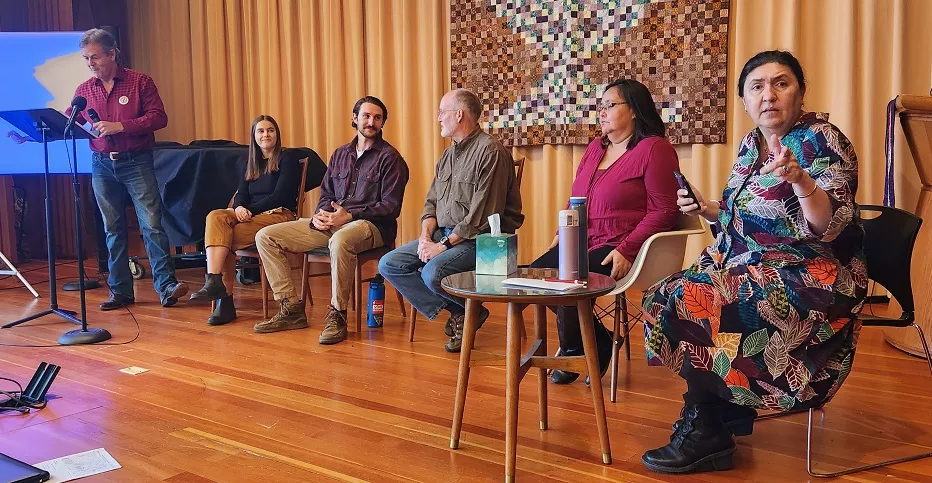
Photo: panelists at the Pipeline Day of Action on November 9, 2022. From the left, James Norris, landowner; Amanda McKay, Pipeline Safety Trust; Chase Jensen, Dakota Rural Action; Paul Blackburn, Bold Alliance; Waniya Locke, resident of Standing Rock, North Dakota; Silvia Secchi, professor at the University of Iowa.
See the 2022 annual meeting "Celebrating 50 Years of the Clean Water Act", October 1, 2022
-
You can view the key note speech by Jerry Anderson on YouTube
-
View the panel discussion on YouTube
Volunteer for the Iowa Chapter
Almost everything we do is done by volunteers like you. If you would like to volunteer for the Iowa Chapter, please let us know by sending an E-mail to Iowa.chapter@sierraclub.org. Or sign up by using the online form. There are many opportunities for you to make a difference:
-
making phone calls
-
developing graphics for banners and flyers
-
working on legislative issues
-
working on elections
-
fundraising
-
organizing events
-
joining an issue committee
If you would like to join our legislative action team, sign up here. Keep on top of what is happening at the Iowa legislature. Be alerted when you should contact your legislators about pending legislation.
Contribute to the Iowa Chapter
Sierra Club - the best bet for achieving bold solutions to Iowa’s environmental problems
Sierra Club is Iowa’s oldest and largest grassroots environmental organization. Not only that, we are the best bet in the state for achieving bold solutions to Iowa’s environmental problems.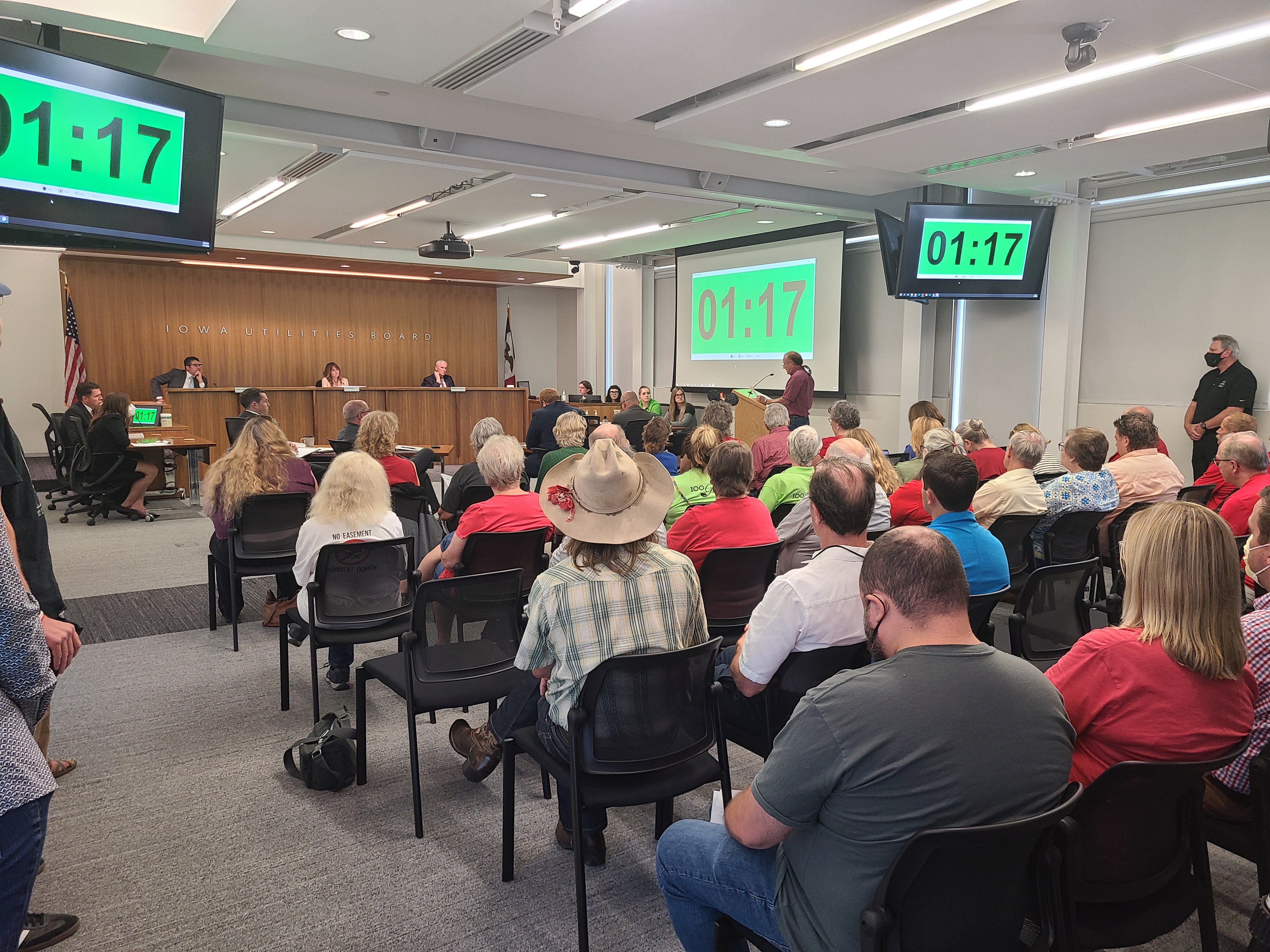
We work in the courts, before Iowa’s public agencies, and in the halls of the legislature. The Iowa Chapter's effort to protect the environment takes financial support. The Chapter receives very little financial support from the national Sierra Club. Can we count on you for a donation to ensure even more victories? Your contribution will be put to work here in Iowa on issues that affect every day Iowans – water quality, clean air, protection of Iowa's soil, parks and natural areas, and a strong democracy. The Iowa Chapter is relentless in fighting back bad legislation that affects every one of us.
Your non-deductible contributions make it possible for us to fight bad legislation and to promote good legislation. We appreciate your past and on-going support of these efforts. You can make a non-deductible donation with a credit card. A non-deductible donation supports the Chapter's effective, citizen-based advocacy and lobbying programs. If you prefer, a non-deductible check can be written to the Sierra Club Iowa Chapter and mailed to:
Treasurer
Sierra Club, Iowa Chapter
PO Box 1058
Marion, IA 52302
You can also make a tax-deductible donation with a credit card. Tax-deductible activities are limited to public interest education, research and legal actions. A deductible check can be written to the Sierra Club Foundation with “Iowa Chapter” written in the memo line.
Thank you for your support.
Donate your used vehicle
As the Sierra Club Foundation's Iowa Chapter continues to raise charitable funds to support its work in Iowa, won’t you consider participating in our vehicle donation program? Our partners over at CARS have made the process of donating your unused or unneeded car, truck, motorcycle, boat or RV easy, efficient and secure. They’ll take care of everything from picking up your vehicle to sending you a tax receipt for your generous gift. To learn more about The Sierra Club Foundation's Iowa Chapter vehicle donation program, please call 844-674-3772. Or visit our webpage to get started today!
Sierra Club Foundation promotes climate solutions, conservation, and movement building through a powerful combination of strategic philanthropy and grassroots advocacy. The Foundation is the fiscal sponsor of Sierra Club’s charitable environmental programs.
For more information
Planned giving . . . naming the Sierra Club Iowa Chapter in your will
Ensure your environmental legacy by naming the Iowa Chapter in your will or trust. These gifts cost you nothing now. You can hold onto your assets for as long as you need them.

Thank you for supporting our work!
| When | Earliest: Latest: |
| What |
|
| Word or Phrase | Word or phrase to search for: |
| Leader | All or part of leader name to search for: |
No Matching Activities Found
Loading
| Date | Activity (click title for full description) | Sponsor | Category | Type | Difficulty | Links |
|---|
Loading ...
 Outing
Outing Club support event
Club support event  Social event
Social event  Activist event
Activist event  Multiple events (map only)
Multiple events (map only)